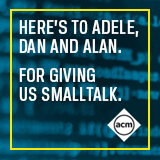
You Don’t Know Jack about Shared Variables or Memory Models:
Data races are evil.
A Google search for "Threads are evil" generates 18,000 hits, but threads are ubiquitous. Almost all of the processes running on a modern Windows PC use them. Software threads are typically how programmers get machines with multiple cores to work together to solve problems faster. And often they are what allow user interfaces to remain responsive while the application performs a background calculation.
Advances and Challenges in Log Analysis:
Logs contain a wealth of information for help in managing systems.
Computer-system logs provide a glimpse into the states of a running system. Instrumentation occasionally generates short messages that are collected in a system-specific log. The content and format of logs can vary widely from one system to another and even among components within a system. A printer driver might generate messages indicating that it had trouble communicating with the printer, while a Web server might record which pages were requested and when.
Code Rototilling:
KV hates unnecessary work.
Dear KV, Whenever a certain programmer I work with needs to add a variable to a function and the name collides with a previously used name, he changes all of the previous instances to a new different name so that he can reuse the name himself. This causes his diffs to be far larger than they need to be and annoys the hell out of me. Whenever I challenge him on this, he says that the old usage was wrong, anyway, but I think that’s just him making an excuse.
BufferBloat: What’s Wrong with the Internet?:
A discussion with Vint Cerf, Van Jacobson, Nick Weaver, and Jim Gettys
Internet delays are now as common as they are maddening. That means they end up affecting system engineers just like all the rest of us. And when system engineers get irritated, they often go looking for what’s at the root of the problem. Take Jim Gettys, for example. His slow home network had repeatedly proved to be the source of considerable frustration, so he set out to determine what was wrong, and he even coined a term for what he found: bufferbloat.



